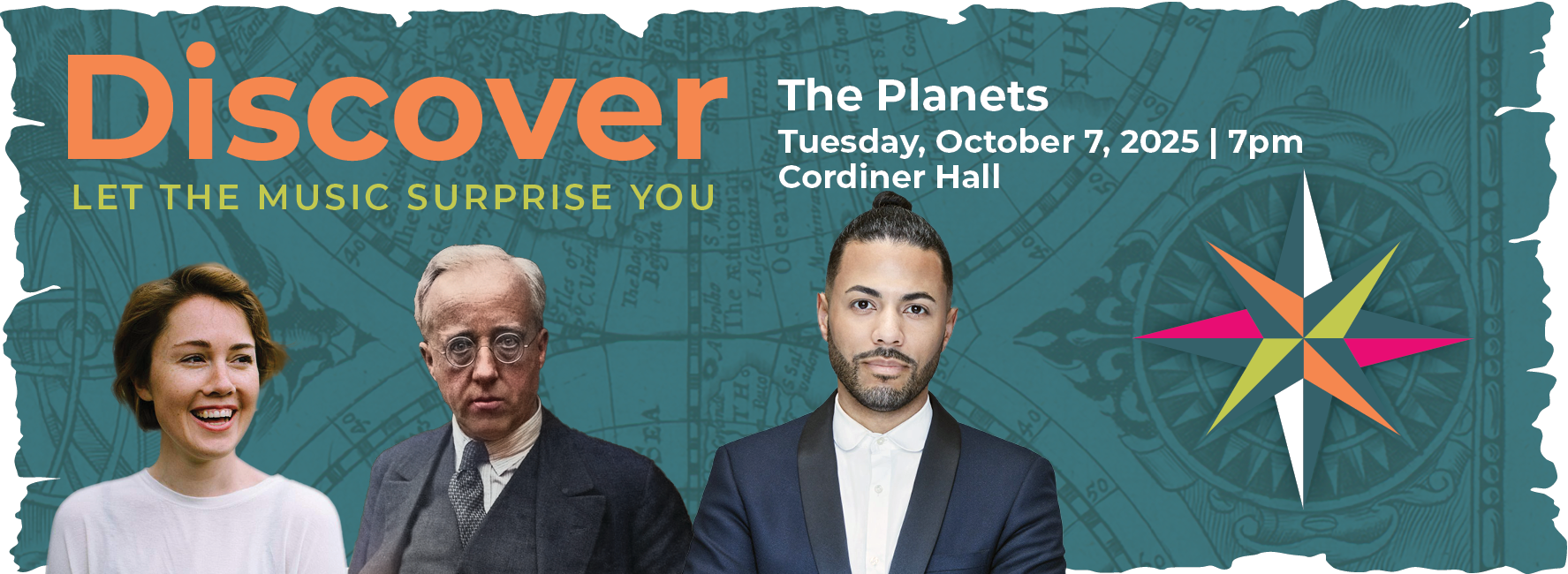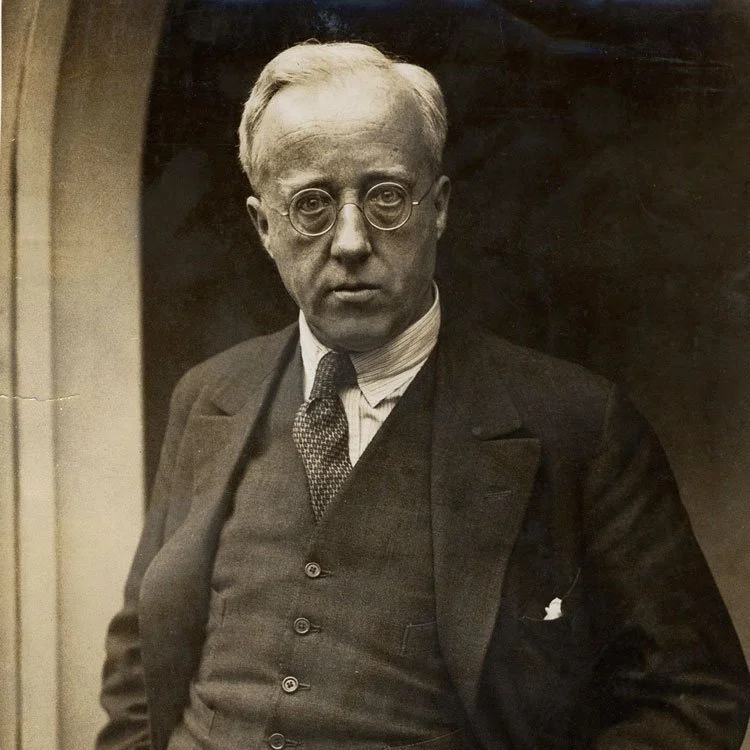Not sure what to wear? Where to park? When to clap? Check out our Concert Guide.
The Program
Samy Moussa - Elysium for Orchestra
Caroline Shaw - The Observatory
Gustav Holst - The Planets, op. 32
Walla Walla Choral Society
Robb Harrison, artistic director and conductor
Concert Snapshots
Elysium was named after the Greek afterlife for heroes, but it’s not dark or sad. Samy Moussa said it’s more about light and beauty than anything gloomy.
Caroline Shaw wrote The Observatory after visiting the Griffith Observatory in Los Angeles, inspired by the city’s views and the wide-open night sky.
Gustav Holst’s The Planets includes Mars, the movement that inspired the music for Star Wars’ “Imperial March.”
Want to learn more? Click the button below to explore articles about the composers and the pieces, and read the program notes.
Explore the Music
Wine Sponsor
Before the concert and during intermission:
Wine is available from our wine sponsor.
Sweet treats and non-alcoholic drinks are also available.
All proceeds support the Walla Walla Symphony.
Dig Deeper
Pittsburgh Symphony Live - Intermission Interviews with Samy Moussa [13:22-18:18] (WQED-FM)
Caroline Shaw is Firing on All Creative Cylinders (SF Classical Voice)
58 Minutes With the Omnivorous Composer Caroline Shaw (Vulture)
‘The Planets,’ the work that made Gustav Holst the equal of a rock star (Chicago Symphony Orchestra)
A beginner’s guide to Gustav Holst’s ‘The Planets’ Suite (Classic FM)
Program Notes
SAMY MOUSSA
Born June 1, 1984, in Montréal, Québec, Canada
Elysium for Orchestra (2021)
Last WWS Performance: First performance at tonight’s concert
Approximate length: 13 minutes
This work was premiered on September 18, 2021, in Barcelona, Spain, at the Basílica de la Sagrada Família by the Vienna Philharmonic conducted by Christian Thielemann. It is scored for piccolo, two flutes, two oboes, two clarinets, two bassoons, contrabassoon, four horns, three trumpets in C, optional piccolo trumpet, two trombones, bass trombone, tuba, timpani, percussion, and strings.
“Born in Montréal in 1984 and now based in Berlin, composer-conductor Samy Moussa is one of today’s leading composers. Moussa’s work has been performed by many of the world’s most prestigious orchestras including Royal Concertgebouw Orchestra, London Symphony Orchestra, and Los Angeles Philharmonic. He has also featured as Artist in Residence at Toronto Symphony Orchestra and works closely with Orchestre Symphonique de Montréal. The 2022/23 season saw the world premiere of his Trombone Concerto Yericho with Orchestre National de Lyon and trombonist Jörgen van Rijen, as well as the European premiere of his Second Symphony with the BBC Scottish Symphony Orchestra at the BBC Proms 2023. Moussa also appeared as conductor with Musikkollegium Winterthur and the Edmonton Symphony Orchestra. Highlights of the 2023/24 season included the world premieres of Antigone, an oratorio for female chorus and orchestra conducted by Erik Nielsen with Dutch National Opera & Ballet, and Adgilis Deda, a hymn for orchestra with the Pittsburgh Symphony Orchestra conducted by Manfred Honeck.”
Elysium dates from 2021 and was a joint commission by the Vienna Philharmonic, Vancouver Symphony Orchestra, Festival de Lanaudière, Royal Scottish National Orchestra, and BBC Scottish Symphony Orchestra. Annotator Thomas May’s description of the work appears on the composer’s official website:
“The title Elysium reflects Moussa’s fascination with ancient Greek and Classical sources. Also known by the epithet “the Elysian Fields,” Elysium refers to a paradisiacal realm, distinct from the Underworld in Greek mythology, that offered a blissful afterlife to heroes and those favored by the gods. Its idyllic promise is described by Homer and Hesiod and echoes through the epics of Virgil and Dante down to the present — even occurring in Beethoven’s Ninth Symphony (in his setting of Schiller’s description of Joy as “daughter of Elysium”).
“Moussa, however, insists on steering clear of any Romantic idealization of the Hellenic world. He particularly admires the work of the pre-Socratic philosophers (most of which survives only in fragmentary form) and singles out a text on the afterlife by Empedocles, a remarkable fifth-century BCE pioneer of natural philosophy who lived in what today is Sicily. Moussa notes that he interprets Empedocles’s image of Elysium “as the ultimate reward for an ethical life” — a reward no longer limited to an elite of god-favored heroes — as “a metaphor for a beautiful life, for a life well-lived on this planet.”
“From Empedocles’s large-scale poem known as Purifications, which treats religious and ethical topics, Moussa cites this fragment, in which Elysium is envisioned as a final escape from the cycle of reincarnation:
“… But, at the last, they appear among mortal men as prophets, songwriters, physicians, and princes; and thence they rise up as gods exalted in honor, sharing the hearth of the other gods and the same table, free from human woes, safe from destiny, and incapable of hurt.”
Biography and program note courtesy of the composer
CAROLINE SHAW
Born August 1, 1982, in Greenville, North Carolina
The Observatory (2019)
Last WWS Performance: First performance at tonight’s concert
Approximate length: 16 minutes
© Kait Moreno
This work was premiered August 27, 2019, by the Los Angeles Philharmonic conducted by Xian Zhang. It is scored for piccolo, two flutes, two oboes, two clarinets, bass clarinet, two bassoons, contrabassoon, four horns, two trumpets, three trombones, tuba, timpani, percussion, and strings.
Caroline Shaw is a musician who moves among roles, genres, and mediums, trying to imagine a world of sound that has never been heard before but has always existed. She works often in collaboration with others, as producer, composer, violinist, and vocalist. Caroline is the recipient of the 2013 Pulitzer Prize in Music, multiple Grammy Awards, an honorary doctorate from Yale, and a Thomas J. Watson Fellowship.
Recent projects include the score to Fleishman is in Trouble (FX/Hulu), vocal work with Rosalía (MOTOMAMI), the score to Josephine Decker’s The Sky Is Everywhere (A24/Apple), music for the National Theatre’s production of The Crucible (dir. Lyndsey Turner), Justin Peck’s Partita with New York City Ballet, a new stage work LIFE (Gandini Juggling/Merce Cunningham Trust), the premiere of Microfictions Vol. 3 for New York Philharmonic and Roomful of Teeth, a live orchestral score for Wu Tsang’s silent film Moby Dick co-composed with Andrew Yee, two albums on Nonesuch (Evergreen and The Blue Hour), the score for Helen Simoneau’s dance work Delicate Power, tours of Graveyards & Gardens (co-created immersive theatrical work with Vanessa Goodman), and tours with So Percussion featuring songs from Let The Soil Play Its Simple Part (Nonesuch), amid occasional chamber music appearances as violist (Chamber Music Society of Minnesota, La Jolla Music Society).
Caroline has written over 100 works in the last decade, for Anne Sofie von Otter, Davóne Tines, Yo-Yo Ma, Renée Fleming, Dawn Upshaw, Los Angeles Philharmonic, Philharmonia Baroque, Seattle Symphony, Cincinnati Symphony, Aizuri Quartet, The Crossing, Dover Quartet, Calidore Quartet, Brooklyn Rider, Miro Quartet, I Giardini, Ars Nova Copenhagen, Ariadne Greif, Brooklyn Youth Chorus, Britt Festival, and the Vail Dance Festival. She has contributed production to albums by Rosalía, Woodkid, and Nas. Her work as vocalist or composer has appeared in several films, TV series, and podcasts including The Humans, Bombshell, Yellowjackets, Maid, Dark, Beyonce’s Homecoming, Tár, Dolly Parton’s America, and More Perfect. Her favorite color is yellow, and her favorite smell is rosemary.
Shaw described the inspiration for The Observatory:
“One morning on a visit to Los Angeles, I hiked up the hill to Griffith Observatory, to clear my head before returning to work on this piece for orchestra. I looked down at the city with all its curving road patterns, and up at the sky, which has been observed and wondered about since the beginning of consciousness. I had been thinking about my friend Kendrick Smith, a cosmologist at the Perimeter Institute who is at the cutting edge of the ancient tradition of stargazing. Kendrick constructs new conceptual frameworks for analyzing data collected by the CHIME radio telescope—developing ways of looking at ways of looking at ways of looking at nn(ways of looking at) the universe. (Maybe that is also what music can be.) There was something about writing for a full symphony orchestra that had made me think about sci-fi films. I love the way epic tales of the beyond can zoom in and out, using imagined alternative universes to tell stories about ourselves on multiple scales at once. And I love how music in these films carves and colors our attention to those worlds (in their various permutations).
“The Observatory features some very large chords, and some very large spaces. Motives appear in diminution and augmentation simultaneously, like objects in orbit at different phases. Patterns in the foreground occasionally yield to patterns hovering in the background (including brief references to Strauss’ Don Juan, Bach’s Brandenburg Concerto No. 3, Sibelius’ Symphony No. 2, Brahms’ Symphony No. 1, and to the arpeggios played on chimes to summon audiences to their seats at formal orchestra concerts). There is celebration and criticism of systems, amid moments of chaos and of clarity. The very large chords return at the end, but their behavior is not the same as when we began.
“I’d like to dedicate The Observatory to Xian Zhang, the brilliant conductor who premiered this work, and whose generosity, wisdom, and energy is something that I aspire to in my own life in music.”
Biography and program notes courtesy of the composer.
GUSTAV HOLST
Born September 21, 1874, in Cheltenham, United Kingdom
Died May 25, 1934, in London, United Kingdom
The Planets, Op. 32 (1914-1917)
Last WWS Performance: May 8, 2018
Approximate length: 55 minutes
This work was premiered on September 29, 1918, before a private audience in the Queen’s Hall, London. It is scored for two piccolos, three flutes, bass flute, three oboes, bass oboe, English horn, three clarinets, bass clarinet, three bassoons, contrabassoon, six horns, four trumpets, two tenor trombones, bass trombone, tenor tuba, bass tuba, timpani, percussion, two harps, celesta, organ, and strings. A women’s chorus sings in the last movement.
Primarily recognized as a composer of strangely approachable, yet austere, works, Gustav Holst was an able composer and talented orchestrator. Having composed since his teens, Holst was accepted by the Royal College of Music where he was a classmate of Ralph Vaughan Williams, who deeply influenced his musical style. He developed an interest in Hinduism, studying its literature and the Sanskrit language. Holst became an active educator, holding positions at St. Paul’s School for Girls and Morley College.
Today’s audiences are often surprised to learn that he composed other significant works in addition to his immensely popular suite, The Planets. However, he created works for nearly every musical genre, including many fine choral settings of English folksongs, several notable pieces for wind band, and numerous stage works (including the Sanskrit opera Savitri). Although Holst was a contemporary of many of the most experimental composers of the twentieth century, he was a proponent of melodic music and found that an approachable musical language could be as profound as more abstract sounds. For this reason, he was always at odds with the more dissonant (and critically accepted) music that came from Schoenberg and his disciples in Vienna.
Holst’s The Planets reflects the composer’s interest in astrology, not astronomy, and the character of the seven movements reflects the astrological personality of the planets included. It should be mentioned here that Holst chose to exclude Earth. Pluto, once considered to be a planet, would not be discovered for a dozen years after the premiere of Holst’s work. Regardless of the mechanics, Holst found the subject to be useful, but had reservations about the forces required to pull it off. World War I had just begun when he completed the Mars movement, itself a portrait of war, in 1914. As musicians were scarce and his work required a huge orchestra, Holst saw no reason to rush and took more than two years to complete it.
The music itself is fascinating, but nearly everything that needs to be known for enjoyment and edification lies in the titles, as each movement is a portrait of an astrological planet. “Mars, the Bringer of War” portrays conflict with the familiar and relentless ostinato rhythm, repeated ad infinitum to great effect. “Venus, the Bringer of Peace” is a lyrical and touching counterpart. The fleet-footed “Mercury, the Winged Messenger” acts as a scherzo with its rapid runs and silvery textures. “Jupiter, the Bringer of Jollity” brims with the spirit of British pomp and pageantry. Holst’s final planets are much more austere and mystical in character. “Saturn, the Bringer of Old Age” traces the stages of life from birth through death. “Uranus, the Magician” uses orchestral sleight-of-hand to depict the conjuring of spells. Holst’s finale is the meditative “Neptune, the Mystic,” which ends with a wordless women’s chorus fading into eternity.
© 2025 Orpheus Music Prose & Craig Doolin
www.orpheusnotes.com





